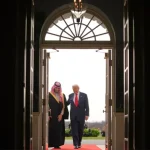
By Teeuwe Mevissen, Senior Macro Strategist at Rabobank
With all the recent news coming out of late, one could not be blamed for making direct comparisons with the Cold War.
Indeed, looking back at the geopolitical events of this week, it is a clear illustration of the ever growing tensions between autocratic states and the West.
But before we dive into this topic lets first discuss this week’s interest rate decision from the Bank of England (BoE).
As was generally expected the BoE raised its policy rate by 25 basis points to a level of 5.25%. But unlike the Fed and the ECB who are close if not at the end of the rate hiking cycle, the market seems to think that the BoE is on a slightly more aggressive rate hiking path given higher and more sticky levels of inflation.
The forward guidance that was provided yesterday could indeed be interpreted as hawkish and reads as follows:
“Given the significant increase in Bank Rate since the start of this tightening cycle, the current monetary policy stance was restrictive. The MPC would continue to monitor closely indications of persistent inflationary pressures and resilience in the economy as a whole, including the tightness of labour market conditions and the behaviour of wage growth and services price inflation. If there were to be evidence of more persistent pressures, then further tightening in monetary policy would be required. The MPC would ensure that Bank Rate was sufficiently restrictive for sufficiently long to return inflation to the 2% target sustainably in the medium term, in line with its remit.”
While the BoE did reduce their growth forecasts through 2025, inflation forecasts were adjusted upwards. While markets on average predict a peak rate of 5,75%, we think the next rate hike by the BoE will be the last rate hike for this year at least bringing the rate to 5.50%. For those who want to read more about yesterday’s interest rate decision please see Stefan Koopman’s post BoE comment here.
While markets mainly focused on the BoE and the downgrade of US creditworthiness by Fitch, some significant, notable and concerning geopolitical developments also took place.
Firstly, two helicopters from Belarus briefly breached Polish airspace after earlier threats to Poland from both the Kremlin as well as the Wagner group.
Moreover, a recent rocket attack on Ukraine’s grain facilities close to the border of Romania, is another example of how close we might be to a direct conflict between NATO and the Russian Union (being Russia and Belarus).
In the past we have seen similar reckless provocations that could lead to a broader escalation.
Meanwhile Putin also seems to be increasingly struggling with internal dissent, or traitors as they are called in Moscow.
Recently some generals and nationalist military bloggers – of which the most prominent is Igor Girkin who is mainly known for downing flight MH17 – have been arrested. The above are all signs that indicate that Putin’s rule is not fully undisputed. In absence of any administrative checks and balances – a characteristic of autocracies – this could mean that the West might face more provocations in an attempt to regain the image of strong and undisputed leader.
Meanwhile China seems to be busy with its own purge.
While speculation about the abrupt disappearance of China’s former Minister of Foreign Affairs Qin Gang is ongoing, the complete military command of China’s rocket force has been reshuffled because of a new anti-corruption investigation. In a bid to increase overall government control a new counter espionage law is now calling for citizens to basically spy on each other.
But for now it seems that is has been Chinese spies that have been caught in the US.
By Teeuwe Mevissen, Senior Macro Strategist at Rabobank
With all the recent news coming out of late, one could not be blamed for making direct comparisons with the Cold War.
Indeed, looking back at the geopolitical events of this week, it is a clear illustration of the ever growing tensions between autocratic states and the West.
But before we dive into this topic lets first discuss this week’s interest rate decision from the Bank of England (BoE).
As was generally expected the BoE raised its policy rate by 25 basis points to a level of 5.25%. But unlike the Fed and the ECB who are close if not at the end of the rate hiking cycle, the market seems to think that the BoE is on a slightly more aggressive rate hiking path given higher and more sticky levels of inflation.
The forward guidance that was provided yesterday could indeed be interpreted as hawkish and reads as follows:
“Given the significant increase in Bank Rate since the start of this tightening cycle, the current monetary policy stance was restrictive. The MPC would continue to monitor closely indications of persistent inflationary pressures and resilience in the economy as a whole, including the tightness of labour market conditions and the behaviour of wage growth and services price inflation. If there were to be evidence of more persistent pressures, then further tightening in monetary policy would be required. The MPC would ensure that Bank Rate was sufficiently restrictive for sufficiently long to return inflation to the 2% target sustainably in the medium term, in line with its remit.”
While the BoE did reduce their growth forecasts through 2025, inflation forecasts were adjusted upwards. While markets on average predict a peak rate of 5,75%, we think the next rate hike by the BoE will be the last rate hike for this year at least bringing the rate to 5.50%. For those who want to read more about yesterday’s interest rate decision please see Stefan Koopman’s post BoE comment here.
While markets mainly focused on the BoE and the downgrade of US creditworthiness by Fitch, some significant, notable and concerning geopolitical developments also took place.
Firstly, two helicopters from Belarus briefly breached Polish airspace after earlier threats to Poland from both the Kremlin as well as the Wagner group.
Moreover, a recent rocket attack on Ukraine’s grain facilities close to the border of Romania, is another example of how close we might be to a direct conflict between NATO and the Russian Union (being Russia and Belarus).
In the past we have seen similar reckless provocations that could lead to a broader escalation.
Meanwhile Putin also seems to be increasingly struggling with internal dissent, or traitors as they are called in Moscow.
Recently some generals and nationalist military bloggers – of which the most prominent is Igor Girkin who is mainly known for downing flight MH17 – have been arrested. The above are all signs that indicate that Putin’s rule is not fully undisputed. In absence of any administrative checks and balances – a characteristic of autocracies – this could mean that the West might face more provocations in an attempt to regain the image of strong and undisputed leader.
Meanwhile China seems to be busy with its own purge.
While speculation about the abrupt disappearance of China’s former Minister of Foreign Affairs Qin Gang is ongoing, the complete military command of China’s rocket force has been reshuffled because of a new anti-corruption investigation. In a bid to increase overall government control a new counter espionage law is now calling for citizens to basically spy on each other.
But for now it seems that is has been Chinese spies that have been caught in the US.
Loading…







